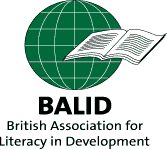
BALID is a UK-based NGO operating as a voluntary organisation under UK law. We are tasked with promoting adult, family and community literacy and numeracy as a basic human right, in the context of international development. Please visit our BALID blog, which is full of interesting contributions from across the world.
BALID brings together practitioners and academics – literacy and language experts, students, early career scholars, NGO staff and policy consultants – in order to explore what this understanding of literacy might mean for social change and community empowerment. For more than a decade we have organised our lively series of Informal Literacy Discussions. We depend financially on our members: please do join us if you can.
We are a global community of people keen to explore the relationship between literacy and international development, particularly among adults.
BALID offers a platform for effective dialogue between organisations and individuals who believe that sharing experiences about learning and literacy can enrich the lives of workers and citizens, whether in low-, middle- or high-income countries.
BALID Vision, Mission and Aim
Vision: That all adults are able to acquire and use an appropriate range of literacies for the benefit of themselves, their family and their community.
Mission: To promote an understanding of literacy as social practice through engaging with practitioners, researchers, and policy makers.
Aim: To be a global community promoting adult, family and community literacies and numeracy as a basic human right, in the context of development, to bring about social change.
Objectives
- To advocate a social practice view of literacy to be embedded into programming and policy-making.
- To encourage the strengthening of literacy practices across all sectors of development, (including health, income generation and environment) in line with the Sustainable Development Goals (SDGs).
- To support the professional development of programme developers and facilitators to incorporate a social practice approach to literacy.
BALID Executive Committee
BALID is managed by an Executive Committee, which includes individual members from different sectors who wish to promote literacy, as well as academics and practitioners working and researching the field in many different parts of the world. Please click on the names to learn more about the current committee members.
- President: Professor Anna Robinson-Pant
- Chair: Dr Mary-Rose Puttick
- Secretary: Dr Catherine Young
- Treasurer: Dr Ian Cheffy
- Committee members
- Professor Gordon Ade-Ojo
- Dr Mary Anderson
- Tara Furlong
- Naeim Maleki
- Dr Katy Newell-Jones
- Dr Chris Millora
HONORARY MEMBERS
- Dr Ulrike Hanemann, Independent consultant in Education
- Dr Willy Ngaka, Makerere University, Uganda
The BALID committee and our members maintain both formal and informal connections to a range of organisations, and these relationships are in constant development. Links to news, reports and events in the field of literacy can also be found on our Facebook page.
Membership
Whilst we welcome all comers to our events, we do encourage membership, so that we can keep in contact, inform you of upcoming meetings, and enjoy sharing experience and expertise. You are very welcome to join BALID, whether you are a student, working for an NGO or university, or just interested in literacy issues. We have various categories of membership, as explained on our application form. The benefits of membership also include reduced rates for attendance at our events, including the Informal Literacy Discussions. Please note that in all our communications we conform to the requirements of GDPR, as explained in our BALID Privacy and data protection policy.
Events
In addition to the Informal Literacy Discussions that we have been running for many years, BALID has organised several seminars in the UK. In the past we have also organised conferences both in the UK and abroad, and this is something that we hope to revive.